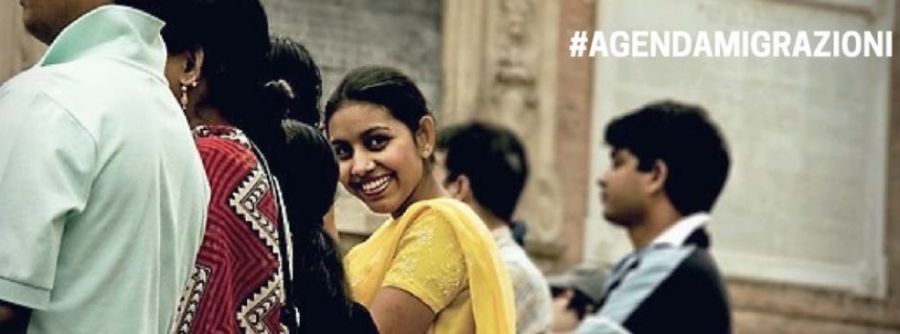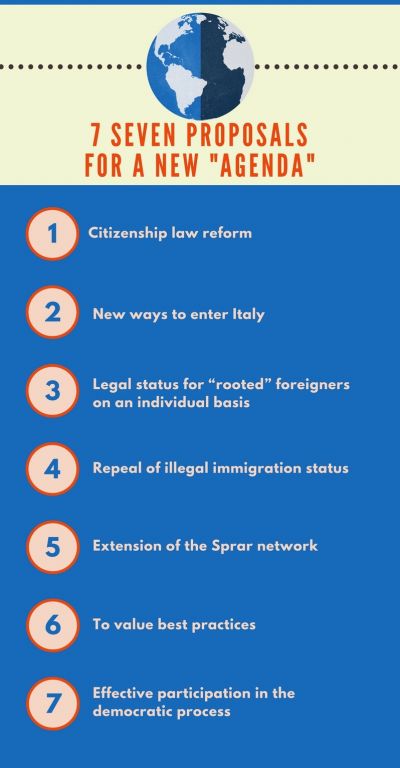
Workshop
On migrants… the union makes an effort

Seven political proposals for a new “agenda”.
Citizenship law reform, new ways to enter Italy, legal status for “rooted” foreigners on an individual basis, repeal of illegal immigration status, extension of the Sprar network (Sytem of Protection of Asylum Seekers and Refugees), best practices and effective participation in the democratic process.
These are the seven points of the policy document that was drawn up by 18 Catholic entities and associations that are involved for various reasons in the field of immigration.
A real immigration campaign that began in the wake of the “Ero Straniero” [I was a stranger] popular effort for changing the Italian immigration law known as “Bossi-Fini”, and to win the challenge by focusing on reception, jobs, and inclusion. The campaign has already gathered 85,000 signatures.
Bossi-Fini is the Italian law that launched restrictive immigration processes in Italy, and it was criticized mostly because it threatened repatriation for thousands of immigrants to countries where human rights are not respected.
“The more we are, the better it is,” says civil lawyer Flavia Cerino, who trains social workers assigned to migrants’ reception. She is also responsible for the immigration section of the Focolare Movement in Italy. “Popular wisdom comes to our aid, because we feel that today’s times are not open to the immigration world and many people, including politicians, do not know how to face the issue of human mobility that has always existed.”
The document was presented on the 8th of February at the Sturzo Institute of Rome, the day after Pope Francis had invited everyone, “citizens and institutions, to join in the effort to prevent human beings trade and guarantee protection and assistance for the victims.”

Flavia Cerino, is it really true that there is this distorted vision of immigration? Are we all that naive?
“The fact is that in recent years there have been terrorist acts linked to the non-Italian world, however, a world that finds it difficult to accept diversity because people connect this issue to terrorism, including media, and in turn this often links migrations to insecurity.”
Can these seven points change this perception?
“Let’s keep in mind that the seven points are integrated, because the issue of immigration is rather “rounded”, in the sense that each point that we dealt with could touch one part of the Italian population. The group that worked on the campaign was restricted, but its presentation on the ground, in different cities, is engaging many more associations that work closely with the local population and, in time, with more focused work, it will show things in their wider dimension.”
But the problems exist…
“The problems certainly exist, but a lack of any narrative on best practices that demonstrate how those problems can be solved also exists. During the press conference Scalabrinians and Salesians explained very well what inclusion is: obviously, any narration is always reductive compared to reality. You need to go and see, in order to really understand, to see the good results that certain practices produce over time, or certain situations that seemed impossible at first. Certainly, we’re not talking about demagogy, we’re not living in the clouds, but it is the strength of our union that enables us to figure out possible solutions.”
A cultural effort is also required…
“Surely, because it would be able to provide a different interpretation of immigration. The citizenry could change its perception. But it is also a way of saying to politicians: “With whom do you intend to make Italy?” We think that the day after the press conference there was the publication of data on nationality, an issue that now also concerns immigrants. Ten years from now Italy will be under-populated, but this campaign can tell Italians that there are also other perspectives. Who will pay for services, pensions, school, and welfare in the years to come? We need to change the trend, as other countries like Germany are already doing with their truly effective and inclusive immigration policies.”
As always, did Germans beat Italians?
“No, they simply see things before we do, they can see the effects in the long period of this situation and understand the possibilities to be found in mutual economic assistance. There are 10,000 people hired in labour centres all over Germany, hired specifically to run the receiving centres. They have begun language classes, cultural courses…”
How does the European Union fit into this process?
“Europe is putting together laws that are much harsher vis-à-vis the issue of immigration, without mentioning that in the next 10 years the Union will have 17 and a half million working-age people less than they have now. This is another reason why the campaign becomes important, to produce a cultural change in mentality toward inclusion and integration, because without such change there cannot be any legislative effect for the good not only of Italy, but of the Community in general.”



